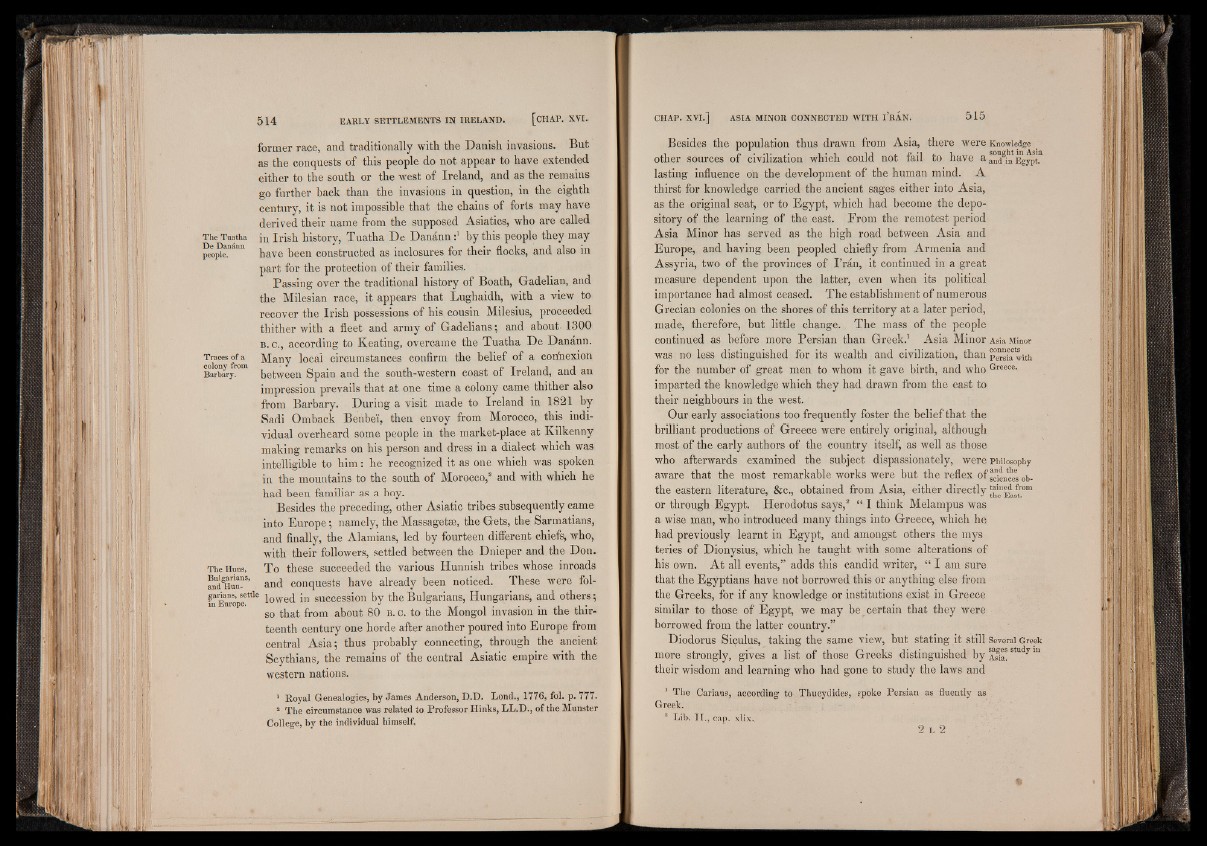
former race, and traditionally with, the Danish invasions. But
as the conquests of this people do not appear to have extended
either to the south or the west of Ireland, and as the remains
go further back than the invasions in question, in the eighth
century, it is not impossible that the chains of forts may have
derived their name from the supposed Asiatics, who are called
TheTuatha jn Irish history, Tuatha De Danann:1 by this people they may
people.1**11'11 have been constructed as inclosures for their flocks, and also in
part for the protection of their families.
Passing over the traditional history of Boath, Gadelian, and
the Milesian race, it appears that Lughaidh, with a view to
recover the Irish possessions of his cousin Milesius, proceeded
thither with a fleet and army of Gadelians; and about- 1300
b . c., according to Keating, overcame the Tuatha De Danann.
Traces of a Many local circumstances confirm the belief of a connexion
BarbaryTOm between Spain and the south-western coast of Ireland, and an
impression prevails that at one time a colony came thither also
from Barbary. During a visit made to Ireland in 1821 by-
Sadi Omback Benbei, then envoy from Morocco, this individual
overheard some people in the market-place at Kilkenny
making remarks on his person and dress in a dialect which was
intelligible to him: he recognized it as one which was spoken
in the mountains to the south of Morocco,2 and with which he
had been familiar as a boy.
Besides the preceding, other Asiatic tribes subsequently came
into Europe; namely, the Massagetee, the Gets, the Sarmatians,
and finally, the Alamians, led by fourteen different chiefs^ who,
with their followers, settled between the Dnieper and the Don.
The Hans, To these succeeded the various Hunnish tribes whose inroads
andHan“ ’ and conquests have already been noticed. These were folgarians,
settle jowe(j jn SUCCession ill Jhurope. by the Bulgaria_ n_s , Hu_n g, a. ria,n s, a« nd « othe* r•s;
so that from about 80 b . c . to the Mongol invasion in the thirteenth
century one horde after another poured into Europe from
central Asia; thus probably connecting, through the ancient
Scythians, the remains of the central Asiatic empire with the
western nations.
1 Royal Genealogies, by James Anderson, D.D. Lond., 1776, fol. p. 777.
2 The circumstance was related to Professor Hinks, L L.D., of the Munster
College, by the individual himself.
Besides the population thus drawn from Asia, there were Knowledge
other sources of civilization which could not fail to have a andêïn Egypt*
lasting influence on the development of the human mind. A
thirst for knowledge carried the ancient sages either into Asia,
as the original seat, or to Egypt, which had become the depository
of the learning of the east. From the remotest period
Asia Minor has served as the high road between Asia and
Europe, and having been peopled chiefly from Armenia and
Assyria, two of the provinces of Tran, it continued in a great
measure dependent upon the latter, even when its political
importance had almost ceased. The establishment of numerous
Grecian colonies on the shores of this territory at a later period,
made, therefore, but little change. The mass of the people
continued as before more Persian than Greek.1 Asia Minor Asia Minor
was no less distinguished for its wealth and civilization, than p^fa with
for the number of great men to whom it gave birth, and who Greece-
imparted the knowledge which they had drawn from the east to
their neighbours in the west.
Our early associations too frequently foster the belief that the
brilliant productions of Greece were entirely original, although
most of the early authors of the country itself, as well as those
who afterwards examined the subject dispassionately, were philosophy
aware that the most remarkable works were but the reflex of s^ences ob-
the eastern literature, &c., obtained from Asia, either directly
or through Egypt. Herodotus says,2 “ I think Melampus was
a wise man, who introduced many things into Greece, which he
had previously learnt in Egypt, and amongst others the mys
teries of Dionysius, which he taught with some alterations of
his own. At all events,” adds this candid writer, “ I am sure
that the Egyptians have not borrowed this or anything else from
the Greeks, for if any knowledge or institutions exist in Greece
similar to those of Egypt, we may be f certain that they were
borrowed from the latter country.”
Diodorus Siçulus, taking the same view, but stating it still Several Greek
more strongly, gives a list of those Greeks distinguished by sAa^ s stndy m
their wisdom and learning who had gone to study the laws and
1 The Carians, according to Thucydides, spoke Persian as fluently as
Greek.